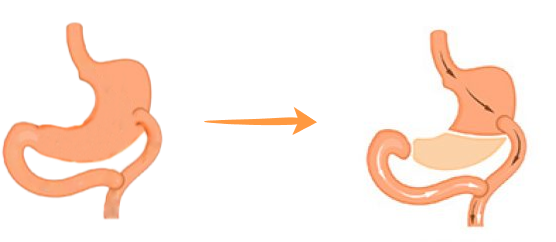- Preparing for Surgery:
Before the procedure, patients will typically need to undergo a thorough medical evaluation and meet with a registered dietitian and bariatric surgeon to discuss the procedure and its potential risks and benefits. Patients will also need to follow a special preoperative diet and may need to stop taking certain medications. - Anesthesia:
The surgery is typically performed under general anesthesia, which means that the patient will be asleep and not feel any pain during the procedure. - Incisions:
The surgeon will make several small incisions in the abdomen, through which they will insert the laparoscope and other surgical instruments. - Creating the Pouch:
The surgeon will create a small pouch at the top of the stomach using surgical staples, which will limit the amount of food that the patient can eat. - Bypassing the Small Intestine:
The surgeon will then divide the small intestine and attach one end to the pouch, bypassing the rest of the stomach and a portion of the small intestine. This allows food to bypass most of the stomach and upper part of the small intestine, reducing the amount of calories and nutrients that can be absorbed. - Closing Incisions:
Once the procedure is complete, the surgeon will close the incisions with stitches or surgical staples. - Recovery:
After the procedure, patients will typically need to stay in the hospital for a few days to recover. They will be given pain medication and will gradually be allowed to start drinking clear liquids and then move on to solid foods. Patients will need to follow a strict diet and exercise plan to ensure optimal results and to avoid complications.
Bariatric Surgery Benefits
Bariatric surgery, also known as weight loss surgery, can offer numerous benefits to individuals who struggle with obesity and related health problems. Here are some potential benefits of bariatric surgery:
- Significant weight loss:
Bariatric surgery can result in significant weight loss, which can improve overall health and reduce the risk of obesity-related health conditions such as diabetes, high blood pressure, and sleep apnea. - Improvement in comorbidities:
Bariatric surgery has been shown to improve or even resolve many obesity-related health conditions such as type 2 diabetes, high blood pressure, sleep apnea, joint pain, and heart disease. - Improved quality of life:
Bariatric surgery can improve a patient’s quality of life by reducing physical limitations, increasing self-esteem, and improving social and emotional well-being. - Increased lifespan:
Bariatric surgery can increase lifespan by reducing the risk of obesity-related diseases and improving overall health. - Reduced healthcare costs:
Bariatric surgery can reduce healthcare costs associated with obesity-related conditions by reducing the need for medications, doctor visits, and hospitalizations. - Long-term weight loss:
Studies have shown that bariatric surgery can lead to long-term weight loss, with patients often maintaining significant weight loss for up to 10 years or more after the procedure.

Bariatric Surgery Procedure
Bariatric surgery is a type of surgical procedure designed to help individuals who are severely overweight, also known as obese, to lose weight. The surgery is performed on the stomach and/or intestines to limit the amount of food a person can eat and/or the amount of nutrients that the body absorbs. Here is an overview of the procedure:

Frequently asked questions
Like any surgery, bariatric surgery carries risks, including bleeding, infection, blood clots, and anesthesia complications. Patients may also experience complications related to weight loss, such as nutrient deficiencies or gallstones. However, serious complications are rare, and the benefits of weight loss surgery typically outweigh the risks.
Weight loss after bariatric surgery varies from patient to patient and depends on the type of surgery and individual factors such as age, gender, and starting weight. However, most patients can expect to lose between 50-70% of their excess weight within 2 years after surgery.
Yes, following a healthy diet is essential for long-term success after bariatric surgery. Patients will need to follow a strict diet plan that typically starts with clear liquids and gradually progresses to solid foods. Patients will also need to avoid high-calorie, high-fat, and sugary foods.
Take charge of your health today. Schedule an appointment.
BOOK A SITTING
